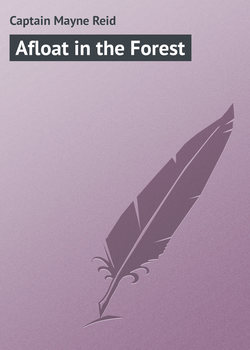Читать книгу Afloat in the Forest - Captain Mayne Reid - Страница 3
Chapter Three. The Galatea
ОглавлениеOn an evening in the early part of December, a craft of singular construction might have been seen descending the Solimoës, and apparently making for the little Portuguese port of Coary, that lies on the southern side of the river.
When we say of singular construction, we mean singular to one unaccustomed to the navigation of Amazonian waters. There the craft in question was too common to excite curiosity, since it was nothing more than a galatea, or large canoe, furnished with mast and sail, with a palm-thatched cabin, or toldo, rising over the quarter, a low-decked locker running from bow to midships, – along each side of which were to be seen, half seated, half standing, some half-dozen dark-skinned men, each plying, instead of an oar, a paddle-blade.
Perhaps the most singular sight on board this embarkation was the group of animated beings who composed its crew and passengers. The former, as already stated, were dark-skinned men scantily clad, – in fact, almost naked, since a single pair of white cotton drawers constituted the complete costume of each.
For passengers there were three men, and a like number of individuals of younger age. Two of the men were white, apparently Europeans; the other was as black as soot could have made him, – unquestionably an African negro. Of the young people two were boys, not much differing in size, and apparently not much in age, while the third was a half-grown girl, of dark complexion, raven-coloured hair, and beautiful features.
One of the white men appeared to be, and was, the proprietor of the montaria, and the employer of its swarthy crew. He was Ralph Trevannion.
The young girl was his daughter, and bore her Peruvian mother’s name, Rosa, more often pronounced by its diminutive of endearment, Rosita. The younger of the two boys – also of dark complexion – was his son Ralph; while the older, of true Saxon physiognomy and hue, was the son of his brother, also bearing his father’s Christian name, Richard.
The second white man was unmistakably of European race, – so much so that any one possessing the slightest knowledge of the Hibernian type would at once have pronounced him a “Son of the Sod.” A pure pug nose, a shock of curled hair of the clearest carrot colour, an eternal twinkle in the eye, a volume of fun lying open at each angle of the mouth, were all characteristics by which “Tipperary Tom” – for such was his sobriquet – might be remembered.
About the negro there was nothing special, more than that he was a pure negro, with enormously thick lips, flattened nose, long protruding heels, teeth white as hippopotamus ivory, and almost always set in a good-humoured grin. The darkey had been a sailor, or rather ship-steward, before landing in Peru. Thither had he strayed, and settled at Cerro Pasco after several years spent aboard ship. He was a native of Mozambique, on the eastern coast of Africa, to which circumstance was he indebted for the only name ever given him, – Mozey.
Both he and the Irishman were the servants of the miner, or rather his retainers, who served him in various ways, and had done so almost ever since his establishing himself among the rocks of Cerro Pasco.
The other creatures of the animated kingdom that found lodgment upon the craft were of various shapes, sizes, and species. There were quadrupeds, quadrumana, and birds, – beasts of the field, monkeys of the forest, and birds of the air, – clustering upon the cabin top, squatted in the hold, perched upon the gangway, the toldo, the yard, and the mast, – forming an epitomised menagerie, such as may be seen on every kind of craft that navigates the mighty Amazon.
It is not our design to give any description of the galatea’s crew. There were nine of them, – all Indians, – four on each side acting as rowers, or more properly “paddlers,” the ninth being the pilot or steersman, standing abaft the toldo.
Our reason for not describing them is that they were a changing crew, only attached to the craft for a particular stage of the long river voyage, and had succeeded several other similar sets since the embarkation of our voyagers on the waters of the upper Amazon. They had joined the galatea at the port of Ega, and would take leave of her at Coary, where a fresh crew of civilised Indians – “tapuyos” – would be required.
And they were required, but not obtained. On the galatea putting into the port of Coary, it was found that nearly every man in the place was off upon a hunting excursion, – turtle and cow-fish being the game that had called them out. Not a canoe-man could be had for love or money.
The owner of the galatea endeavoured to tempt the Ega crew to continue another stage. It was contrary to their habit, and they refused to go. Persuasion and threats were tried in vain. Coaxing and scolding proved equally unavailable; all except one remained firm in their refusal, the exception being an old Indian who did not belong to the Ega tribe, and who could not resist the large bribe offered by Trevannion.
The voyagers must either suspend their journey till the Coary turtle-hunters should return, or proceed without paddlers. The hunters were not expected for a month. To stay a month at Coary was out of the question. The galatea must go on manned by her own people, and the old Indian who was to act as pilot. Such was the determination of Ralph Trevannion. But for that resolve, – rash as it was, and ending unfortunately for him who made it, – we should have no story to tell.
